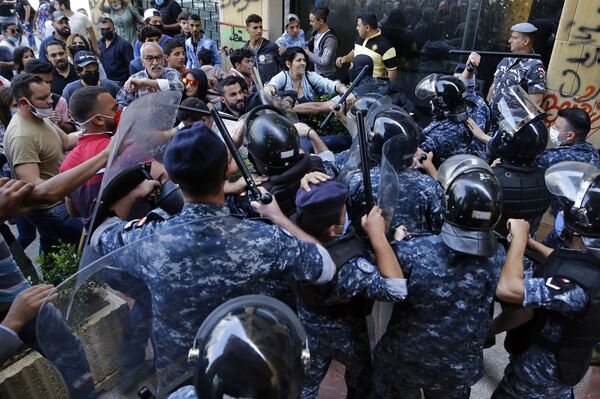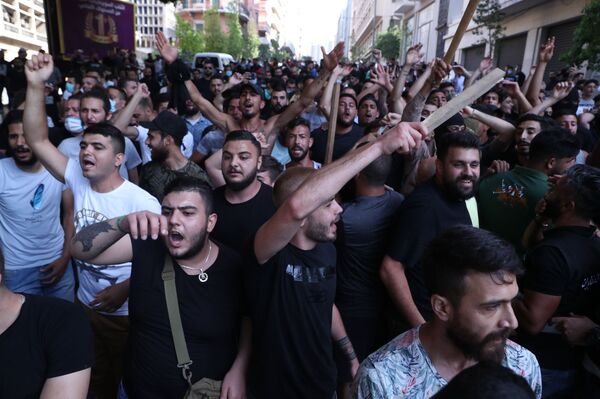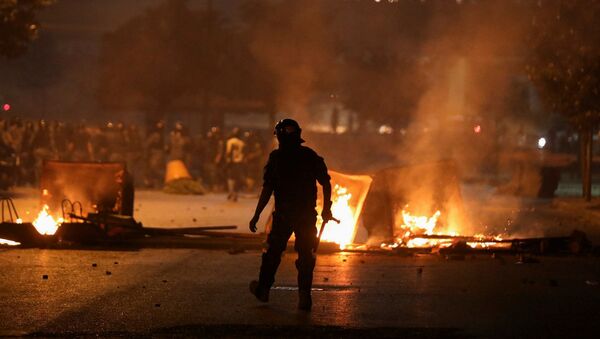UN Human Rights Chief Michelle Bachelet on Friday warned that the situation in Lebanon was "spiralling out of control" and urged the nation's political parties and the financial sector to "work together to protect the poorest and the defenceless".
Her statement comes as the economic situation in the country continues to worsen, triggered by the political instability that kicked off last October following the government's decision to introduce taxes on gasoline, tobacco, and the use of WhatsApp.
Mass protests that followed shortly thereafter led to the toppling of the previous government of Saad Hariri and the appointment of a new prime minister, Hassan Diab, with crowds hoping he would bring about much needed change.
Broken Hopes
The outbreak of the coronavirus at the end of February brought those hopes to a halt.
In an attempt to contain the spread of the virus, the government closed down public institutions, government offices, and private businesses. But apart from keeping the pandemic simmering on low, it also led to economic difficulties that have been aggravated by the pandemic.
Such was the case with Lebanon's unemployment rate. In 2019, it stood at slightly more than six percent. Now, however, after a series of protests and strict measures aimed at curbing the coronavirus, the numbers are much higher, at over 30 percent of the total population. Fifty percent live below the poverty line.
"When the protests just started, hundreds of businesses were shut down but [as the days went by] the situation continued to deteriorate. In the following months, Lebanon has seen more outlets closing as their owners couldn't cope with the turbulence of the currency and the rapid change that has been happening", said Mohammed Kleit, a political activist, who has participated in the demonstrations since they first began.

To tackle the rising challenges connected with the pandemic, the government initiated a number of attempts to cater to the needs of the population. State banks have been asked to reschedule loans for small- and medium-sized enterprises at low rates, while 200,000 families in need have received a so-called emergency social safety net of $150 each.
That, however, was way too little to keep the economy going. In May, in a bid to get itself out of the worst economic crisis since the 1970s, the government started talks with the International Monetary Fund to unlock billions of dollars in aid. But 16 meetings down the line, the prospects for funding still appear remote, pushing the Lebanese public to take matters into their own hands.
While some Lebanese volunteers formed aid groups, collecting money for food, medical supplies, and other basic necessities and distributing them to impoverished families, others resorted to exchanging household utensils for medication and food.
But Kleit said these initiatives were only a temporary solution and that the situation was so fragile that it could explode at any given moment.
"The current state of affairs has already sparked social and security problems. Theft has gone up, but money is not what's being stolen. Rather it is such basics as milk, bread, and medicine", he said, adding that in order to bring about change, the protesters must unite against their common foe.
Protesters Divided?
The problem is that divisions within the ranks of the demonstrators run way too deep to form a unified national front.
"When the protests broke out in October, we were all united against the deteriorating economic situation, the rule of banks and corruption, but as the days went by, some groups started to deviate from our main causes and started raising issues that became controversial in our society", explained Kleit.
One of the most important issues concerns the Iran-backed Shiite militia Hezbollah and people's attitudes toward it. Although perceived as the force that liberated Lebanon, driving Israel's military away in the early 2000s, its accumulation of weapons, which made it one of the strongest militias in the region, has become a bone of contention among the Lebanese public.
It was for this along with ongoing Israeli pressure, that in 2018 and 2019 the US imposed a series of sanctions on banks, companies, and individuals linked to Hezbollah to force it to halt its military activity. But while the group didn't change course, Washington's strict measures hurt Lebanon's economy and prompted many to call on the Shiite militia to disarm itself.
There have also been calls to "kill" Hezbollah politically, says Kleit, adding that would be an extremely "undemocratic move", especially given that despite the protests the group is still supported by the masses.

In 2018, during the last round of the parliamentary election, Hezbollah together with other religious parties won some 30 seats in the 128-seat parliament. A year later, a poll showed that around 90 percent of Shiite Muslims, which make up a third of Lebanon's population were supportive of the group.
Yet, there are other voices as well.
"Although during the pandemic, Hezbollah supported its loyalists by giving out food and medications, there have also been cases when their supporters joined the mass protests, encouraged by the mass media who initiated a campaign to demonise the group. Later on, they abandoned that camp but the damage [to their reputation] has already been done".
Other religious groups have also shown little support for Hezbollah. According to a poll conducted last year by the Washington Institute, some 89 percent of Lebanon's Sunni Muslims had negative views of the Shiite militia, and 67 percent of Christians held a similar stance.
Kleit acknowledges these challenges and doesn't pretend the protests will put an end to sectarian battles. Instead, he calls on all factions to put their differences aside and focus on more burning issues, such as the formation of a productive economy that would be able to sustain itself rather than rely on western donations.
It won't be easy to achieve, he warns, but Lebanon doesn't have any other option, primarily because if people don't become united, the already clouded horizon will look even bleaker.
"While I think that a civil war is far-fetched, primarily because there's an obvious winner, Hezbollah, with its strong military forces, experience in guerilla warfare and weapons’ arsenal, but I do believe that crime rates will go up if the situation is not controlled, which is a natural outcome of hunger, poverty, unemployment, and social tensions".




